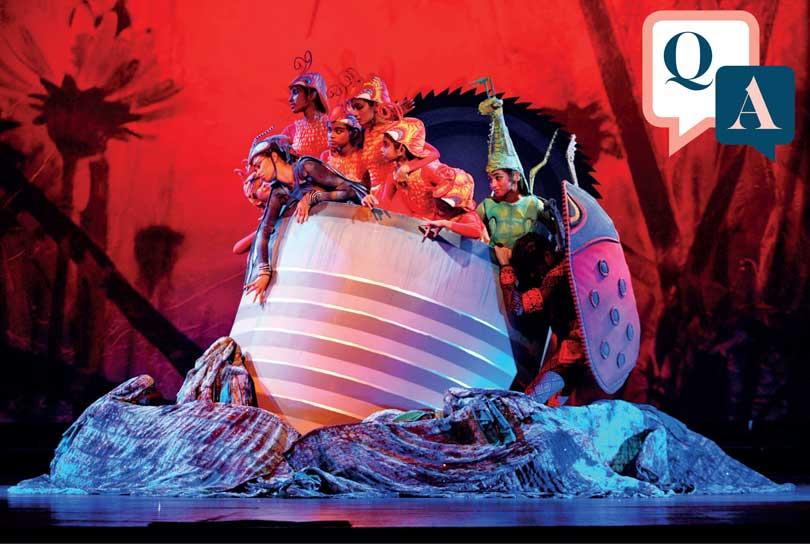
- The “Keep fit” class incorporates some Kandyan exercises, yoga, pilates, etc. It is the class that is designed for a full body workout to the beat of the Kandyan drum
 Taking over the mantle as the principal dancer of the Chitrasena Kalayathanaya since the retirement of her aunt Upeka Chitrasena, lissome and beautiful Thaji Dias is shouldering the responsibility of keeping the tradition of dance alive.
Taking over the mantle as the principal dancer of the Chitrasena Kalayathanaya since the retirement of her aunt Upeka Chitrasena, lissome and beautiful Thaji Dias is shouldering the responsibility of keeping the tradition of dance alive.
The granddaughter of the pioneers of dance Chitrasena and Vajira, it is safe to say that dance courses through her veins. When she is not travelling the world showcasing Sri Lankan traditional dance, Thaji spends much of her time teaching at the Chitrasena Kalayathanaya helping to create the next generation of traditional dancers.
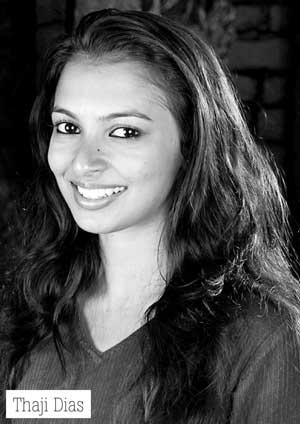
The Chitrasena Kalayathanya is one of the oldest dance schools in Colombo. Established by Guru Chitrasena in 1944 to nurture traditional dancers for the proscenium stage, the Kalayathanaya acts as the main body that feeds highly trained dancers into the Chitrasena Dance Company, which has showcased Sri Lankan traditional dances on the world stage for over 8 decades. The Chitrasena Kalayathanaya combines the skills, talents and service of many members of the Chitrasena family, from daughters to granddaughters who all play a pivotal role in the running of the school. For Thaji keeping the tradition of dance alive is of paramount importance and along with the rest of the Chitrasena family are deeply devoted to growing the school and training many new generations of traditional dancers.
Q What led you to become a teacher?
I was only 12 years old when I started teaching at the Chitrasena School of Dance. Some of us who trained at least 3 to 4 times a week, got this opportunity to teach early. It also depends on how much you have learnt and how well we excel in class. My aunt Anjalika used to get me to demonstrate movements and exercises in her classes from the time I was about 5 years old. However, it was my grandmother, Vajira, who initiated me to start teaching. My aunt Upeka always says, teaching is very important for a dancer because in the process, you start to understand how to self-correct, you begin analyzing movement differently helping another body to get it just right.
Q Tell us more about what you teach.
The Kalayathanaya has its own unique syllabus that it follows which was developed by Guru Vajira in the 60’s and 70’s and continues to evolve. The foundation level training she developed incorporates many exercises, to condition the body and mind of a complete beginner before introducing the traditional dance exercises. My grandmother insisted that one must discipline the mind and the body first, to become a great artist. And even if you don’t end up becoming a performer this training can help you become the best in any field you choose.
The main aim of the school is not just to create world-class performers and/ or great teachers but also to nurture a sense of community, creativity and a love of dance. Most past pupils I have heard say, it is the discipline and a deep connection to something meaningful in life that they have carried with them even to this day.
Q What forms of Dance do you teach in the school?
We specialize in Kandyan Dance which is one of the 3 main traditional dance forms in Sri Lanka. We believe it takes a lifetime to learn an art form. So, once the technique has been digested well alongside learning to play the Kandyan drum as well, students can opt to learn the Ruhunu style. Also whenever possible we do try to give our students opportunities to experience other dance forms and allied art forms through workshops.
Classes at the Kalayathanaya Credit - CVDF Archives
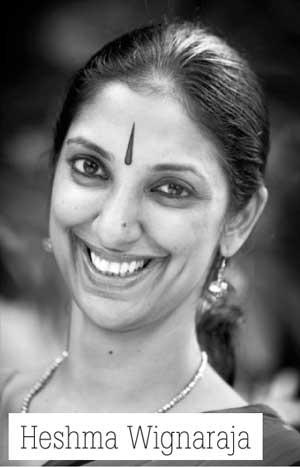 Q How important are these classes to ensure the traditional dances are kept alive?
Q How important are these classes to ensure the traditional dances are kept alive?
Our traditional art forms, I feel, are actually dying as they evolve with current trends. After all, it’s an endangered movement language unique to our island. It may survive as long as there are artistes willing to make it their lifelong practice. The stage adaptation of the Dance is executed very differently to the ritual form. Because the purpose is different. The way you learn matters, the imparting of knowledge of performance art and the craft, the commitment to practice matters and of course the intension of why you do it is everything.
Q Can you explain how Dance can be a beneficial form of exercise?
Learning Kandyan Dance is physically very taxing. The form is primarily a deep seated position, very earthbound, but dynamic and full of vigour. So it is a full body workout, very similar to following a fitness class or even maybe more intense. Arms and thigh muscles are utilized the most. At the Kalayathanaya training we have incorporated a lot of strengthening and balancing exercises too. And we learn about our breath and how to control it when dancing. So for those who want to do classes just for fitness and wellbeing, that too is possible at the Kalayathanaya. But those classes are designed differently.
Q Tell us about the “keep fit” dance class?
The “Keep fit” class incorporates some Kandyan exercises, yoga, pilates, etc. It is the class that is designed for a full body workout to the beat of the Kandyan drum. This class is for students or adults who want a simple physical workout or for weight loss than learning a dance technique.
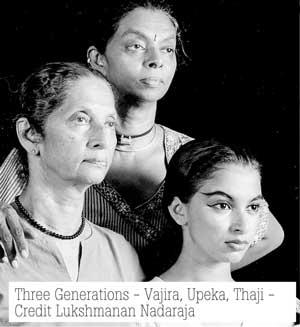 Q How long is the class and what is the duration of the course?
Q How long is the class and what is the duration of the course?
The class is 1 hour and 15 minutes long. We do not offer a course as such. The duration of learning solely depends on each student’s commitment. Attendance is key and how much interest you have in remembering the material and the details matter.
Q Where can those interested get more details from?
The Chitrasena Kalayathanaya is situated on Elvitigala Mawatha, Colombo 5. The office is open from Monday to Friday from 10am to 5pm and on Saturday from 9am to 12noon. You can follow our facebook page under the name of Chitrasena Dance Company to get new updates on classes and performances. You can email us at
[email protected] for more information.
Photos courtesy Chitrasena Kalayathanaya

 Taking over the mantle as the principal dancer of the Chitrasena Kalayathanaya since the retirement of her aunt Upeka Chitrasena, lissome and beautiful Thaji Dias is shouldering the responsibility of keeping the tradition of dance alive.
Taking over the mantle as the principal dancer of the Chitrasena Kalayathanaya since the retirement of her aunt Upeka Chitrasena, lissome and beautiful Thaji Dias is shouldering the responsibility of keeping the tradition of dance alive. The Chitrasena Kalayathanya is one of the oldest dance schools in Colombo. Established by Guru Chitrasena in 1944 to nurture traditional dancers for the proscenium stage, the Kalayathanaya acts as the main body that feeds highly trained dancers into the Chitrasena Dance Company, which has showcased Sri Lankan traditional dances on the world stage for over 8 decades. The Chitrasena Kalayathanaya combines the skills, talents and service of many members of the Chitrasena family, from daughters to granddaughters who all play a pivotal role in the running of the school. For Thaji keeping the tradition of dance alive is of paramount importance and along with the rest of the Chitrasena family are deeply devoted to growing the school and training many new generations of traditional dancers.
The Chitrasena Kalayathanya is one of the oldest dance schools in Colombo. Established by Guru Chitrasena in 1944 to nurture traditional dancers for the proscenium stage, the Kalayathanaya acts as the main body that feeds highly trained dancers into the Chitrasena Dance Company, which has showcased Sri Lankan traditional dances on the world stage for over 8 decades. The Chitrasena Kalayathanaya combines the skills, talents and service of many members of the Chitrasena family, from daughters to granddaughters who all play a pivotal role in the running of the school. For Thaji keeping the tradition of dance alive is of paramount importance and along with the rest of the Chitrasena family are deeply devoted to growing the school and training many new generations of traditional dancers. 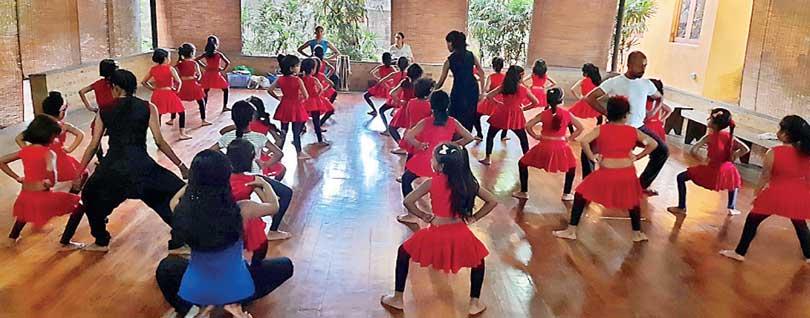
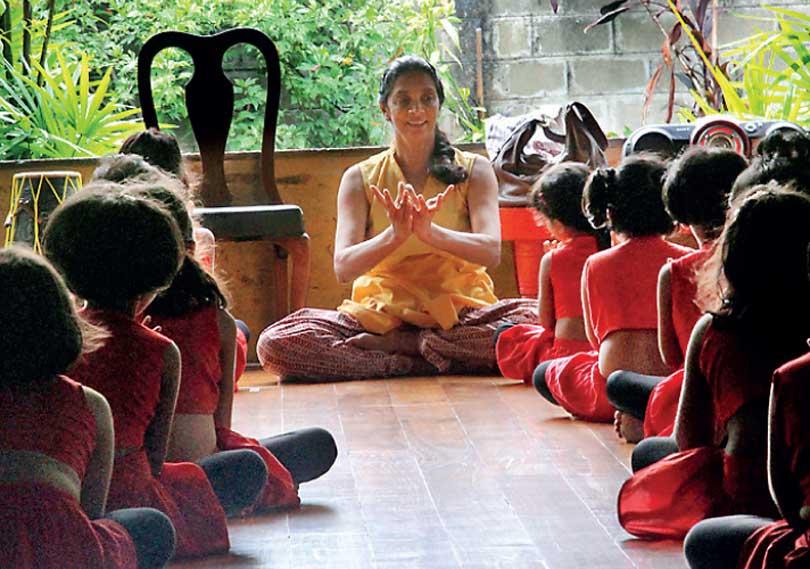
 Q How important are these classes to ensure the traditional dances are kept alive?
Q How important are these classes to ensure the traditional dances are kept alive? Q How long is the class and what is the duration of the course?
Q How long is the class and what is the duration of the course?